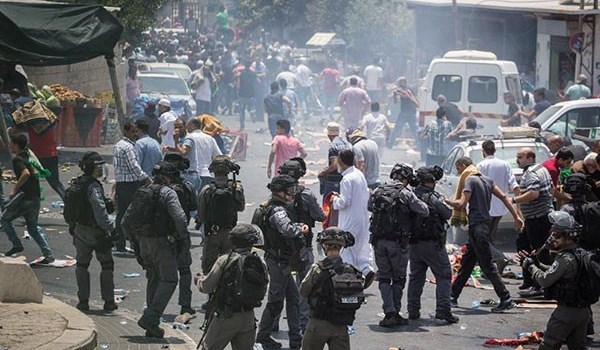
RNA - The demonstrators called for the end of Israeli occupation of Palestinian lands. Chanting “Free Palestine!” the demonstrators also called on people across the world to boycott Israel. The protests followed similar events in the Middle East and in Europe over the past few days.
On Thursday, July 27, Israel expanded their easing of the security imposed around the al-Aqsa mosque, removing surveillance cameras just days after taking out the metal detectors. This saw a return of celebrating Palestinian worshipers to the mosque. But because nothing can ever go smoothly in the occupied territories, Israeli forces responded to the crowds of worshipers by immediately attacking them, throwing stun grenades into the crowds and releasing tear gas, and confiscating any Palestinian flags people had on them. At least 113 Palestinians were reported injured in the incident, a toll that’s likely to rise.
It is obvious that despite the lifting of the blockade around the mosque, the occupied Palestinian territories will continue to witness fresh tensions one way or another, given the fact that Israeli forces will continue to introduce restrictions and arrest Palestinians on vague charges everywhere, and not just at the al-Aqsa Mosque. It’s brutal, ugly and illegal. And it reflects almost all aspects of Palestinian lives:
1. Palestinians can’t live free of Israeli military presence.
When the Israel-Palestine conflict is referred to as an “occupation,” it’s not figurative — occupied Palestinian territories, specifically the West Bank and East Jerusalem al-Quds, are constantly patrolled and controlled by the Israeli military. These armed soldiers have been accused of beating, detaining and torturing, and killing Palestinians without any justification.
2. Palestinians in Gaza can’t control the flow of goods and supplies.
Israel maintains a strict blockade on Gaza that allows it to control what flows in and out of the territory. Israeli leaders claim the blockade aims to prevent Hamas - a resistance movement that came to rule the territory after it was elected to power in parliamentary elections in 2006 - from acquiring weapons. In 2011, a UN panel ruled the blockade constituted collective punishment, a violation of International Law.
3. Palestinians can’t control their access to water or certain life-saving health care.
Since the beginning of the military occupation in 1967, Israel has controlled access to water in the occupied Palestinian territories. The majority of the water from the area’s two main sources goes to Israeli areas. There are frequent water shortages in the West Bank and poor water quality in Gaza, according to the UN Human rights Council. Due to the blockade, many hospitals in the Gaza Strip lack critical equipment and resources. For cancer treatment, which is hard to come by in Gaza, Palestinians have to request permission from Israel to travel elsewhere.
4. Most Palestinians can’t enjoy the rights of citizenship.
Palestinians living under Israeli occupation are effectively a stateless people, who, for the most part, lack rights to citizenship in any sovereign nation.
5. Palestinians don’t have the same due process and civil rights as Israelis.
Palestinians can be imprisoned without charge for a period of up to six months under the Israeli policy of administrative detention.
6. Palestinians can’t travel in, out and through occupied territories without restriction.
Israel has implemented strict travel restrictions in and outside the occupied Palestinian territories for decades, making it difficult for Palestinians to leave, return and travel through the areas.
In summation, there will be no peace in the Holy Land so long as this fundamental truth is not told – that since 1967 the Palestinians have been occupied by the Zionist regime of Israel – with full support from the United States. Meaning, the Palestinians do not need an “honest broker” in Washington refereeing their “dispute.” They need an honest judge to deliver justice.
847/940